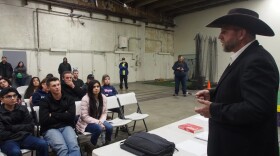
Kirk Siegler
As a correspondent on NPR's national desk, Kirk Siegler covers rural life, culture and politics from his base in Boise, Idaho.
His beat explores the intersection and divisions between rural and urban America, including longer term reporting assignments that have taken him frequently to a struggling timber town in Idaho that lost two sawmills right before the election of President Trump. In 2018, after the deadliest and most destructive wildfire in California history, Siegler spent months chronicling the diaspora of residents from Paradise, exploring the continuing questions over how – or whether – the town should rebuild in an era of worsening climate-driven wildfires.
Siegler's award winning reporting on the West's bitter land use controversies has taken listeners to the heart of anti-government standoffs in Oregon and Nevada, including a rare interview with recalcitrant rancher Cliven Bundy. He's also profiled numerous ranching and mining communities from Nebraska to New Mexico that have worked to reinvent themselves in a fast-changing global economy.
Siegler also contributes extensively to the network's breaking news coverage, from floods and hurricanes in Louisiana to deadly school shootings in Connecticut. In 2015, he was awarded an international reporting fellowship from Johns Hopkins University to report on health and development in Nepal. While en route to the country, the worst magnitude earthquake to hit the region in more than 80 years struck. The fellowship was cancelled, but Siegler was one of the first foreign journalists to arrive in Kathmandu and helped lead NPR's coverage of the immediate aftermath of the deadly quake. He also filed in-depth reports focusing on the humanitarian disaster and challenges of bringing relief to some of the Nepal's far-flung rural villages.
Before helping open the network's first ever bureau in Idaho at the studios of Boise State Public Radio in 2019, Siegler was based at the NPR West studios in Culver City, California. Prior to joining NPR in 2012, Siegler spent seven years reporting from Colorado, where he became a familiar voice to NPR listeners reporting on politics, water and the state's ski industry from Denver for NPR Member station KUNC. He got his start in political reporting covering the Montana Legislature for Montana Public Radio.
Apart from a brief stint working as a waiter in Sydney, Australia, Siegler has spent most of his adult life living in the West. He grew up in Missoula, Montana, and received a journalism degree from the University of Colorado at Boulder.
-
Two large mines important for America's green energy transition are being fought in federal court by Native Americans who say the developments would destroy sacred, religious sites.
-
The antigovernment militant is scheduled to appear in a Boise, Idaho, court Monday on charges stemming from a tense protest that led to the lockdown of one of the state's large hospitals.
-
Western tribes are making a last ditch effort to thwart a large lithium mine in a federal appeals court.
-
West Coast Native American tribes will make a last-ditch effort in federal court Tuesday to block what would be the nation's largest lithium mine.
-
One small Caribbean country is trying to become the world's most climate resilient nation, even in the face of rising seas and intensifying storms.
-
As the Atlantic hurricane season begins, there is anxiety on the small island nation of Dominica which is still reeling from Hurricane Maria that damaged or destroyed 95% of its housing.
-
The state of Arizona today said it will no longer issue new development approvals based on groundwater alone.
-
There are winners and losers in the new landmark deal to avert a water shortage crisis on the Colorado River. But experts say it doesn't go far enough and no one should be celebrating.
-
A new breakthrough deal for sharing the over-promised Colorado River has been reached by the seven states that share it.
-
Some tribes have won big water agreements with the U.S. recently which is giving them an unprecedented seat at the table as the White House resets the water sharing agreement for the Colorado River.






